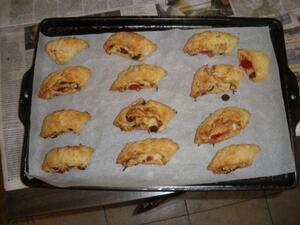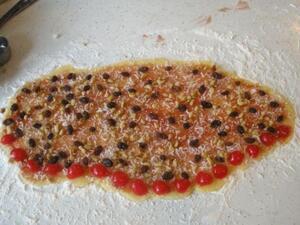Eating Jewish: Strudel
I have come to take for granted that with a quick search on Google I can easily find most recipes that I’m looking for. If for any reason I don’t find what I want on the Internet, I can usually consult my ever-growing collection of cookbooks to find the recipe I need. This means that a huge number of recipes are literally at my fingertips whenever I need them. However, my most recent time in the kitchen reminded me that this was not always so.
This week I was invited to make strudel with my friend’s mom who explained to me that we were using a famous family recipe that originally came from her grandmother and is now one of her mother’s signature dishes. Yet this recipe hadn’t always been committed to writing and when her mother wanted to make this strudel herself, she had to stand in the kitchen along with her mother-in-law, who cooked without a recipe, and measure everything that she put into the strudel. For generations of women, written recipes were not the norm and the instructions for dishes were passed on orally and then mastered as they were made. I usually rely on written recipes when I’m in the kitchen and I admire those women who can create a delicious meal without one. Do you know a woman who cooks this way? I think it would be great to spend some time in the kitchen with her and learn recipes that would be lost if they weren’t passed on or written down.
Prior to making this family recipe, I assumed that the strudel we were going to be making would be filled with apples, as was the case with most of the strudel I have previously eaten. However when I read the recipe I was surprised to see that the filling didn’t consist of apples, but of strawberry jam, shredded coconut, chopped walnuts, raisins and a few maraschino cherries. Having always encountered one type of filling, I began looking at strudel recipes and found that this pastry, which became popular in the area that used to be the Austro-Hungarian Empire, can be filled with various things such as sour cherries, curd-cheese, apricot or walnuts. Therefore strudel filling will vary depending on the traditions and tastes of a particular family or according to what’s in season at the time that it’s being made. The filling we used was surrounded by a simple dough that bakes up to be light and flaky, and the perfect balance to the sweetness of the filling. While this dough was easy to make, strudel dough has also been known to be a painstaking endeavor. According to Claudia Roden it was traditional for Jewish housewives in Vienna and Budapest to make their own paper-thin dough. The aim was to make dough that was thin enough through which to be able to read a newspaper or a letter that wouldn’t rip!
Whether you choose to follow this family recipe and fill your strudel with jam, coconut, walnuts, raisins and cherries or create your own signature filling, this will make a delicious dessert that can be served at the end of a meal or as a snack alongside a cup of tea. Once you have made this recipe, try to share it with friends and family, you may even be lucky enough to get some new recipes in return.
Strudel
Courtesy of Shelley and Mollie Rothman
Dough
2 1/8 cups flour
½ cup Crisco
1/3 cup oil
1 egg
1/3 cup sugar
2 teaspoons baking powder
¼ cup orange juice
A little less than a ¼ cup of warm water
Filling
½ cup strawberry jam or any other jam of your choice
½ cup sweetened shredded coconut
¼ cup chopped walnuts
¼ cup raisins or currants
Approximately 16 maraschino cherries cut in half (optional)
1. Preheat the oven to 350 degrees.
2. In a big bowl, cut the Crisco into the flour using two knives. You want to end up with pea-sized pieces of Crisco throughout the flour. Make a well in the center of the Crisco and flour mixture. Around the side of the well sprinkle the sugar and the baking powder. Add the oil and the egg to the center of the well and mix them lightly with a fork. Following this, add the orange juice and water into the well.
3. Using a fork draw the dry ingredients into the well, mixing until the wet and dry ingredients are combined and form a soft dough. Begin by using a fork to mix these ingredients and finish by using your hands to form the dough. Refrigerate the dough for 1-2 hours.
4. Cut the dough in half and on a floured surface roll out each half into a rectangle that is approximately 8 by 12 inches and ¼ of an inch thick. Spread each half with jam and top with the coconut, walnuts and raisins. If you are using the maraschino cherries, place them on the longer side of the rectangle from which you will begin rolling the strudel. They should be placed ½ an inch apart and 1 inch away from the side of the dough.
5. Roll the dough, starting from the longer side of the rectangle on which the cherries have been placed, into a log. Use a spatula to help roll the dough over.
6. Diagonally cut the log into pieces that are approximately 1 inch wide. Place the slices on a cookie sheet that has been lined with parchment paper and bake for about 15-20 minutes or until they are golden brown.
Yield: Approximately 24 pieces








